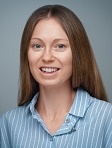 Emily Stanford ha un Dottorato in Linguistica conseguito all’Università di Ginevra con una specializzazione in Psicolinguistica.
Emily Stanford ha un Dottorato in Linguistica conseguito all’Università di Ginevra con una specializzazione in Psicolinguistica.
Nella sua attuale ricerca post-dottorale all’Università di Ginevra, che è un’estensione del progetto Europeo ‘Syntactic Cartography and Locality in Adult Grammar and Language Acquisition (SynCart)’, sta indagando se l’acquisizione della sintassi nello sviluppo tipico è determinata dalla geometria dell’albero sintattico.
Inoltre, è la destinataria di un bando di mobilità post-dottorale rilasciato dalla Swiss National Science Foundation (SNSF) tramite il quale è attualmente in visita presso l’Università degli Studi di Milano-Bicocca. La sua ricerca legata a questo bando intende esaminare la validità diagnostica di nuove misure indipendenti dal linguaggio nella valutazione di deficit sintattici in bambini multilingui.